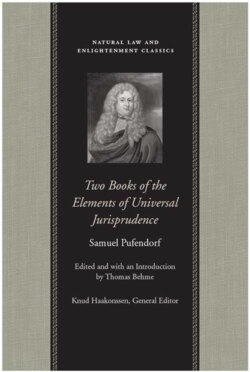Читать книгу Two Books of the Elements of Universal Jurisprudence - Samuel Pufendorf - Страница 8
На сайте Литреса книга снята с продажи.
ОглавлениеA NOTE ON THE TEXT
During Pufendorf’s lifetime seven editions of the Latin text appeared: The Hague 1660, Jena 1660, Zwickau 1668, Jena 1669, Cambridge 1672, Frankfurt and Jena 1680, and Frankfurt 1694. The only modern translation is the English by William Abbott Oldfather based on the text of the Cambridge 1672 edition. Supplied with scanty philological notes and a photographic reprint of the Latin text, it was published in 1931 in the Classics of International Law Series by the Carnegie Endowment for International Peace (vol. 15). Parts of the Elements were also translated in a selection of texts edited by Craig L. Carr and translated by Michael Seidler.1 I was responsible for a definitive Latin edition published as volume 3 of Samuel Pufendorf, Gesammelte Werke (general editor Wilhelm Schmidt-Biggemann). It is based on the Latin text of the first edition (1660) and supplemented by the appendix on the moral sphere that was added to editions since 1669. Like all of the Gesammelte Werke, this is a critical variorum edition that is primarily directed to a scholarly audience well acquainted with the Latin language.
The present edition is a revision of Oldfather’s translation from 1931, which has been checked for mistranslations of the Latin text of 1672.2 A great part of my revisions concern inconsistencies in the translation of technical terms, which I have standardized to their proper English equivalents. Where a term requires deviation from the standard translation, the Latin original is added in square brackets. Thus Oldfather translates potestas, an active moral power to perform a voluntary action legitimately,3 as “authority” in most instances but sometimes switches to “power,” even in contexts where potestas has clearly been used in the normative sense. Here the translation has been standardized to “authority,” while potentia, a (natural) power or potency, is translated throughout as “power.” In those few instances where potestas has been used in the sense of a natural power, it will be rendered as “power [potestas].” In the instances where the Latin auctoritas (or autoritas) had also been translated as authority, I have added the Latin in brackets. In the case of imperium, which denotes an “authority over the persons of others,”4 Oldfather’s translation switches between “command,” “authority,” and “sovereignty,” according to the different contexts. Since Pufendorf primarily uses imperium as a technical term for the highest authority in the state, the translation has been standardized to “sovereignty” in most instances. In those few cases where imperium denotes the authority of commanding in a more general sense or a subordinate authority (for example, of a commanding officer), “command [imperium]” is used.
Oldfather’s annotations, which predominantly deal with misprints in the Latin text, have for the most part been dropped in favor of new annotations by the present editor. Readers interested in philological aspects of the Latin text are referred to the philological annotations to my critical Latin edition. Those Oldfather notes that have been retained are preceded by an asterisk and have “Tr.” (translator) at the end of the note. The new annotations give short explanations on background and on items dealt with in the text that might be strange to modern readers. In particular, they identify allusions and references not made explicit by Pufendorf in the Elements. Sometimes this identification requires a consideration of sources cited in JNG that might also be seen as probable sources of the Elements insofar as their publication dates preceded that of the Elements. When the annotation refers to sources cited in JNG, their citation follows the English Oldfather edition of JNG. For the reader’s convenience modern editions of these sources are given in the bibliography.
Page breaks in the 1931 edition are indicated in the present edition by the use of angle brackets. For example, page 112 begins after <112>.
Thomas Behme
